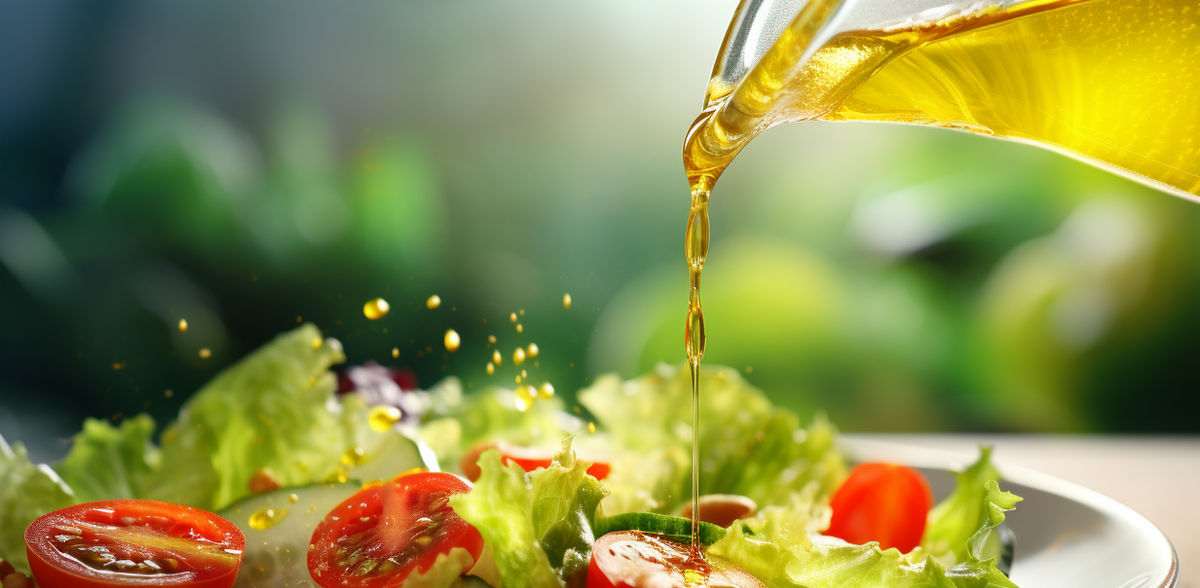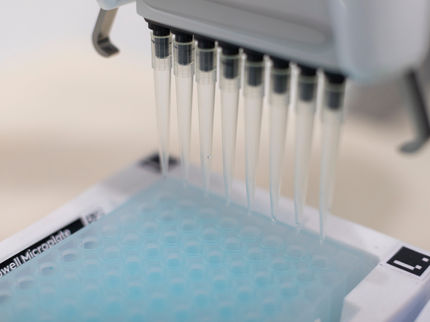New fatty acids found in vegetable oils
Characterize vegetable oils comprehensively
Whether in salad dressings, for sautéing and deep-frying, or in cake batter - vegetable oils are a key ingredient in food preparation. With a sales volume of almost 80 million liters per year and a market share of around 40 percent, rapeseed oil is the most popular vegetable oil in Germany. Scientists from the Department of food chemistry headed by Prof. Dr. Nils Helge Schebb have now succeeded in identifying previously unknown fatty acids in rapeseed and linseed oil. In this way, they were able to clearly identify the omega-3 fatty acid "densipolic acid" in these oils, which is currently the subject of little research, and determine its content.
The researchers hope that this will contribute to a basic understanding of the composition of plant oils and provide a new basis for investigating the authenticity, i.e. purity, of plant oils.
Vegetable oils play an important role in human nutrition as they are the main source of the essential (polyunsaturated) fatty acids linoleic acid (LA) and α-linolenic acid (ALA). The human body cannot produce essential fatty acids itself, but must absorb them through food. The consumption of vegetable oils such as rapeseed, sunflower or flaxseed oil has increased massively in the past century: More than 215 billion liters of vegetable oils are consumed worldwide every year.
Characterizing vegetable oils comprehensively
"Due to the relevance and the considerable share of vegetable oils in human nutrition, it is important to characterize these oils as comprehensively as possible," says Prof. Dr. Nils Helge Schebb. At the University of Wuppertal, the analysis of vegetable oils is one of the research areas of his working group. The (food) chemists are mainly concerned with the oxidation products of the fatty acids contained in the oils, the so-called oxylipins. In a recent study, Schebb's team, together with the Max Rubner Institute in Detmold, Germany, analyzed the oxylipin pattern in flaxseed, rapeseed and sunflower oil using liquid chromatography-mass spectrometry (LC-MS) and gas chromatography-mass spectrometry (GC-MS). The oxylipins found were identified by using authentic reference standards, some of which were synthesized in the laboratory itself
"In the process, we were able to detect not only already known, but also unknown oxylipins - such as densipolic acid, which has been little described to date - in relevant concentrations," says Nils Schebb. Initial studies of their formation suggest that the oxylipins are formed under the action of enzymes (mainly FAD 3).
Results to be incorporated into future studies
Thus, the study as a whole provides unique data on the diverse oxylipin patterns in plant oils and helps to improve the understanding of the composition of plant oils. In future studies, in addition to more detailed investigations of oxylipin formation, the scientists also want to carry out further characterization of the substances found in order to be able to define new parameters for assessing oil quality.
Note: This article has been translated using a computer system without human intervention. LUMITOS offers these automatic translations to present a wider range of current news. Since this article has been translated with automatic translation, it is possible that it contains errors in vocabulary, syntax or grammar. The original article in German can be found here.
Original publication
Most read news
Original publication
Elisabeth Koch, Ariane Löwen, Nadja Kampschulte, Kathrin Plitzko, Michelle Wiebel, Katharina M. Rund, Ina Willenberg, Nils Helge Schebb; "Beyond Autoxidation and Lipoxygenases: Fatty Acid Oxidation Products in Plant Oils"; Journal of Agricultural and Food Chemistry, Volume 71, 2023-8-25
Topics
Organizations
Other news from the department science

Get the analytics and lab tech industry in your inbox
By submitting this form you agree that LUMITOS AG will send you the newsletter(s) selected above by email. Your data will not be passed on to third parties. Your data will be stored and processed in accordance with our data protection regulations. LUMITOS may contact you by email for the purpose of advertising or market and opinion surveys. You can revoke your consent at any time without giving reasons to LUMITOS AG, Ernst-Augustin-Str. 2, 12489 Berlin, Germany or by e-mail at revoke@lumitos.com with effect for the future. In addition, each email contains a link to unsubscribe from the corresponding newsletter.
Most read news
More news from our other portals
See the theme worlds for related content
Topic world Gas chromatography
Gas chromatography is an essential method in analytical chemistry for the separation and analysis of volatile compounds. Due to its high resolution and sensitivity, it has become firmly established in areas such as environmental analysis, food chemistry or forensic science. GC provides precise and reliable results and enables deep insights into the chemical composition of samples.

Topic world Gas chromatography
Gas chromatography is an essential method in analytical chemistry for the separation and analysis of volatile compounds. Due to its high resolution and sensitivity, it has become firmly established in areas such as environmental analysis, food chemistry or forensic science. GC provides precise and reliable results and enables deep insights into the chemical composition of samples.
Topic World Food Analytics
Food analysis methods enable us to investigate the quality, safety and composition of our food. Whether in the traceability of food, the detection of contaminants or the verification of nutritional information - food analytics plays a crucial role in our health and nutrition. Welcome to the exciting world of food analytics!

Topic World Food Analytics
Food analysis methods enable us to investigate the quality, safety and composition of our food. Whether in the traceability of food, the detection of contaminants or the verification of nutritional information - food analytics plays a crucial role in our health and nutrition. Welcome to the exciting world of food analytics!
Topic World Mass Spectrometry
Mass spectrometry enables us to detect and identify molecules and reveal their structure. Whether in chemistry, biochemistry or forensics - mass spectrometry opens up unexpected insights into the composition of our world. Immerse yourself in the fascinating world of mass spectrometry!

Topic World Mass Spectrometry
Mass spectrometry enables us to detect and identify molecules and reveal their structure. Whether in chemistry, biochemistry or forensics - mass spectrometry opens up unexpected insights into the composition of our world. Immerse yourself in the fascinating world of mass spectrometry!
Topic World Chromatography
Chromatography enables us to separate, identify and thus understand complex substances. Whether in the food industry, pharmaceutical research or environmental analysis - chromatography opens up a treasure trove of information about the composition and quality of our samples. Discover the fascinating world of chromatography!

Topic World Chromatography
Chromatography enables us to separate, identify and thus understand complex substances. Whether in the food industry, pharmaceutical research or environmental analysis - chromatography opens up a treasure trove of information about the composition and quality of our samples. Discover the fascinating world of chromatography!




























































